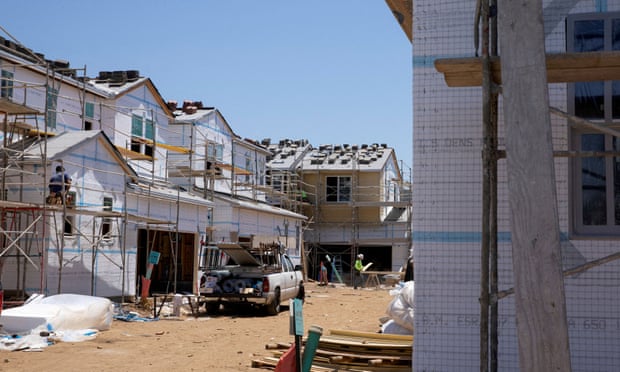Era of soaring house prices is ending as central banks raise rates | Larry
It’s over. An era of ever-rising house prices stimulated by cheap money is coming to an end. Central banks created a colossal real estate boom and soon they will have to cope with the consequences of the bubble being pricked.
In China it is already happening. Banks in the world’s second biggest economy are under orders to bail out property developers so they can complete unfinished projects. Mortgage boycotts are on the rise because people are, unsurprisingly, unhappy about paying home loans for properties they are unable to occupy.
Sales of new properties have plunged and new housing starts have almost halved compared with pre-pandemic levels, spelling problems for heavily indebted property companies, the banks they have borrowed from and the wider economy. The property sector accounts for about 20% of China’s gross domestic product. Rising house prices are already a thing of the past.
The US economy contracted for a second successive quarter in the three months to June and one factor was a rapidly slowing property market. In the two years from the start of the coronavirus pandemic in the spring of 2020, American house prices have soared, rising by 20% in the year to May. But the market is cooling fast, with the average price of new homes dropping sharply in June.

Britain appears to be bucking the trend. According to figures from the Halifax, the country’s biggest mortgage lender, house prices are rising at an annual rate of 13% – the highest in almost two decades. Here, too, the picture is changing.
Last week the Office for National Statistics published data for housing affordability, based on the ratio of property prices to average earnings. In Scotland and Wales, the ratio was 5.5 and 6.0 respectively, below peaks reached at the time of the 2007-09 global financial crisis. In England the ratio was 8.7, the highest since the series began in 1999.
Within England there were regional variations. In Newcastle upon Tyne the cost of an average home was 12 times the annual income of someone in the lowest 10% income bracket. In London it was 40 times, and it is almost certainly higher now. The ONS figures cover the period up to March 2021 and since then house prices have comfortably outstripped wages.
There comes a point where housing simply becomes too expensive for potential buyers, but a prolonged period of ultra-low interest rates means it has taken time to arrive at this reality checkpoint. Central banks have made the unaffordable affordable by ensuring monthly mortgage repayments remain low.
That has been true around the world, which is why from New York to Vancouver, from Zurich to Sydney, from Stockholm to Paris the trend in house prices has been relentlessly upwards.
Until now, at least. Central banks in the west are aggressively raising interest rates, making mortgages more expensive. Even before the US Federal Reserve last week announced a second successive 0.75-point increase in official borrowing costs, a new borrower taking out a 30-year fixed home loan was paying a rate of about 5.5% – double that of a year earlier. That increase explains why fewer…
Read More: Era of soaring house prices is ending as central banks raise rates | Larry
